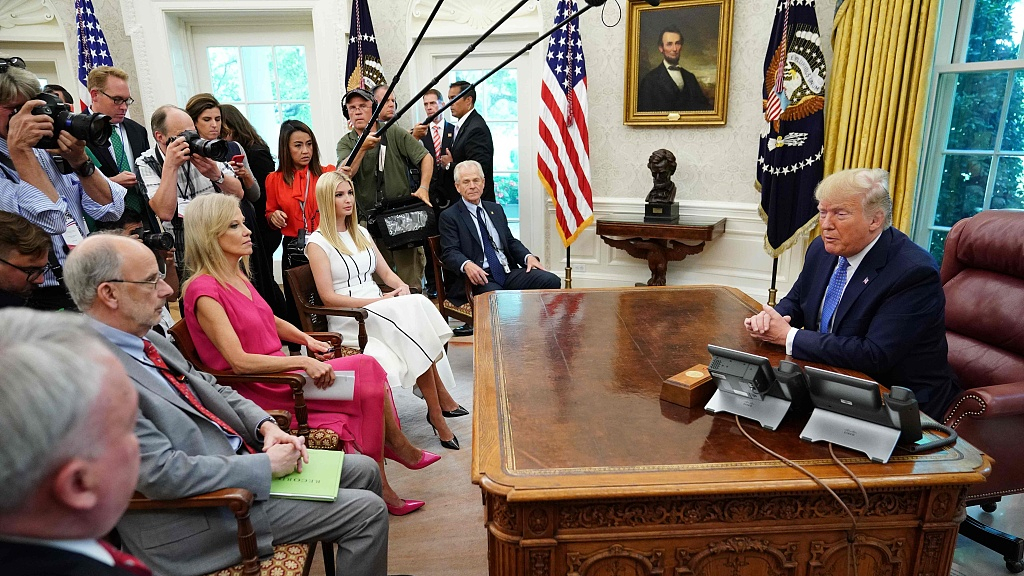
(Photo: VCG)
Editor's note: Keith Lamb is a University of Oxford graduate with a MSc degree in Contemporary Chinese studies. His primary research interests are international relations of China and China's "Socialism with Chinese Characteristics."
On Aug. 2, Trump sent out a tweet threatening to impose 10-percent tariffs on $300 billion Chinese goods imported into the US. To justify his act, he claimed in his Twitter post that China has continued to sell fentanyl to the US, despite the agreement reached between the two countries in May.
However, in reality, Trump needs to take a look closer at home.
Fentanyl is a synthetic opioid that has legal and medical uses. It is used to manage pain during surgery and treat moderate to severe chronic pain. However, it is also a drug that is heavily abused in the US. As it is 80-100 times stronger than morphine, it has led to thousands of deaths.
US has accused China of being the leading supplier of illegal fentanyl. As such, during the April round of trade negotiation, the US side requested China to curb the unlawful production of this drug.
What they've failed to notice is that China has already started dealing with this problem. As early as 2017, China had enacted stricter laws than other countries on illegal fentanyl production. The UN standard is curbing 21 derivatives of fentanyl. China's National Narcotics Control Commission went further by banning 25 types. And, in response to the US' request, China banned all fentanyl derivatives starting May 1. The fact that China has banned all fentanyl derivatives shows Beijing is serious about stamping out the trade.
However, proving that something is a derivative or a completely different compound is not so clear cut. No matter how hard China works to curb the production of illegal fentanyl, it would be too much to expect considerable reductions in only a few months. Trump's comments are thus premature and at best naïve. And to point to China as being individually responsible for America's drug woes is a cheap shot that disregards the complexities of the international drugs trade as well as problems specific to the US.
China's National Narcotics Control Commission denies that there is substantive proof that the majority of illegal fentanyl is exported from China. And, without agents working on the US side, the importation of drugs into the US would be impossible. It is irresponsible for Trump to point the finger at China when the US has been fighting a losing drug war for decades. The problem is quite simple that drug-taking in the US and Western society is, in general, tolerated and seen as a sign of individual liberty. Smoking cannabis is almost a rite of passage for US university students. Former President Bill Clinton famously admitted that as a student he tried marijuana but didn't inhale. Obama smoked too.
Drug use in American society has become more and more liberalized to the extent that cannabis is now increasingly decriminalized. The trend for increased legal and illegal drug consumption in the US is one that had risen long before China even had the technology to produce pharmaceuticals en masse.
Without restricting mass consumption of drugs in the US, it will be impossible to halt production completely. Even with close cooperation between Colombia and US intelligence, the cocaine trade has not come to a halt. American forces in Afghanistan did not bring the heroin trade to its knees. Big pharma wants to make profits in league with medical professionals who freely prescribe opioids. Addictions.com, whose mission it is to help families and individuals with substance abuse problems, lists Abbott Labs, Johnson & Johnson, Pfizer, Novartis, Covidien, Watson Pharmaceuticals and Endo Pharmaceuticals as being the key companies behind the opioid crisis in the US. None of these are Chinese companies. And none of these is China's problem.
For Trump, to try to demonize China for what is a homegrown problem is a cheap trick. America's drug crisis is a disaster and a crime, but it's not China's fault. While China must do its best to curb illegal fentanyl production – Rome wasn't built in a day. The US and the Trump administration need to do some honest soul-searching. Pointing the finger at China for all of America's woes is dishonest, and with dishonesty, nothing constructive will be accomplished in future trade talks.


